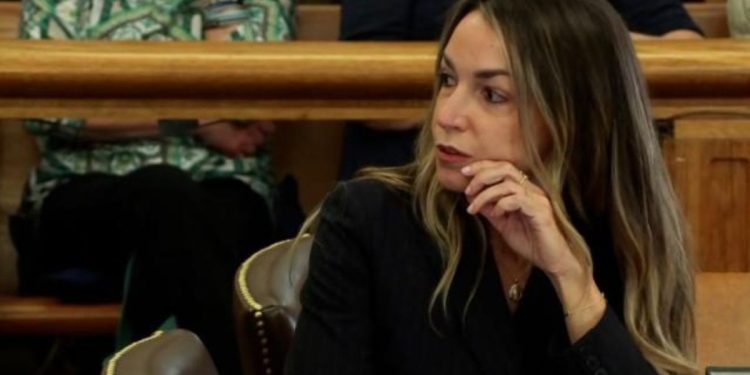The Karen Read murder trial has hit a roadblock as the jurors have failed to reach a unanimous verdict. In response to a note from the jury expressing their inability to come to a decision, the Massachusetts judge overseeing the case has instructed them to continue deliberations.
After a thorough examination of all the evidence presented and careful consideration of all disputed matters, the twelve-person jury in the case of Read, who is charged with driving under the influence and fatally colliding with her police officer boyfriend in January 2022 before fleeing the scene, informed the court of their inability to reach a unanimous verdict shortly after midday, stating, “Despite our exhaustive review of the evidence and our diligent consideration of all disputed evidence, we have been unable to reach unanimous verdict.”
Norfolk County Superior Court Judge Beverly Cannone has asked the jury to continue deliberating after listening to arguments presented by the prosecution and defense.
Cannone instructed the jurors to clear their minds and take a break for lunch, which would be arriving shortly. Once they have had their meal, they can resume their deliberations.
The jury persisted with their deliberations until just after 4 p.m. local time, following the judge’s order. It was announced that discussions would recommence on Monday morning at 9 a.m.
Since noon on Tuesday, the jury has been contemplating the fate of Read. The case has been riddled with allegations of a massive police cover-up and instances of improper conduct, including sexist text messages from a lead investigator.
Both the prosecution and defense presented their views on the jury’s note, urging the judge to take into account various possibilities while making a decision on what to communicate to the jury.
Norfolk County Assistant District Attorney Adam Lally emphasized that it is premature to provide the jury with any Tuey-Rodriguez instruction or similar guidance. He clarified that the note from the jury doesn’t explicitly state their inability to reach a verdict, but rather indicates that they haven’t come to a conclusion yet through their deliberation process.
Defense attorney David Yanetti suggested that the jury be presented with the Tuey-Rodriguez criminal model instructions, signaling their desire for a hung jury.
According to him, the key term in this case is “exhaustive.” He explained to the judge that the parties involved have conveyed that they have tried every possible means of compromise and persuasion, but to no avail. They have reached a point where they are unable to make any further progress.
In making the decision to send the jury back to deliberate the verdict in the controversial case, the judge carefully considered the arguments of both counsels. It is worth noting that the Tuey-Rodriguez instructions were not read to the jury. According to case law, reading these instructions prematurely is discouraged.
According to Massachusetts law, Read, who is 45 years old, has entered a plea of not guilty to charges of second-degree murder, vehicular manslaughter while intoxicated, and leaving the scene of a collision resulting in death. If convicted of second-degree murder, Read could face a maximum sentence of life in prison.
On January 29, 2022, Boston Police Officer John O’Keefe’s body was discovered bruised and battered in the snow outside the house of a fellow Boston police officer in Canton, Massachusetts. His girlfriend was left devastated by the tragic incident.
According to prosecutors, Read and O’Keefe, who had a complicated relationship, got into an altercation that night. Allegedly, Read was intoxicated and ended up backing into O’Keefe before fleeing the scene, leaving him to perish in the cold.
During the closing arguments on Tuesday, prosecutor Adam Lally stated that the facts and evidence clearly indicate that the defendant drove her vehicle in reverse at a speed of 24.2 mph for a distance of 62.5 feet, ultimately striking Mr. O’Keefe and causing his catastrophic head injuries, which left him incapacitated and ultimately led to his death due to freezing.
Defense attorney Alan Jackson boldly stated that a cover-up occurred in this case, without a doubt. He acknowledges that many may not want to believe that such a situation could happen within their community, but the evidence presented over the past eight weeks is undeniable.
As the murder trial came to a close, it was evident that the case had gained attention not only locally but also nationally. There were allegations of witness tampering, and a federal investigation into the investigation was also reported. During the trial, a group of supporters wearing pink could be seen chanting, “Free Karen Read.” Nonetheless, the closing arguments marked the end of this highly publicized trial.
The prosecution has faced several obstacles due to a number of missteps and unorthodox investigative techniques. One of the most significant issues was caused by lead investigator, Massachusetts State Police Trooper Michael Proctor, who confessed to sending derogatory and sexist messages about Read in a private group chat. In these messages, he referred to her as a “whack job,” made fun of her medical problems, and informed his colleagues that he had not found any nude photos while searching her phone for evidence. These revelations were reported by CNN affiliate WCVB.
While on the stand, Proctor expressed remorse for making unprofessional comments. However, his vulgar texts have garnered sharp criticism not only within the court, but also from the governor.
Governor Maura Healey expressed her strong disapproval of the texts, calling them unprofessional and a threat to the dignity and integrity of law enforcement officials across the state. She stated that as a former attorney general and current governor, she was disgusted by the content of the messages.










